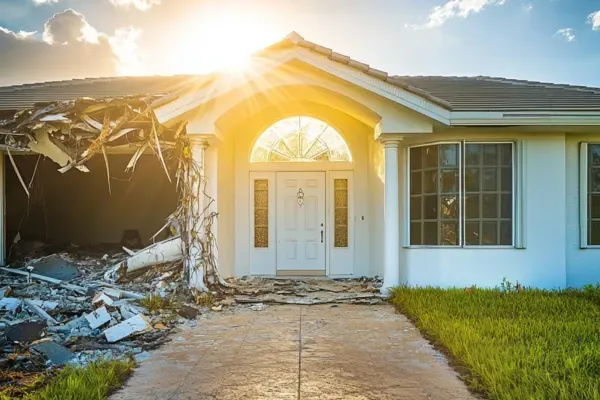
How Long Does It Take to Foreclose in Florida
Last Updated: May 27, 2025
Article By: Jared A.
Facing the possibility of foreclosure can feel like an overwhelming burden, and we understand how daunting this time can be for you and your family. If you’re asking, “How long does it take to foreclose in Florida?” you’re seeking clarity in a moment of uncertainty. The foreclosure process in Florida is a complex, judicial procedure that unfolds over months, but understanding its timeline and steps can empower you to make informed decisions. This article is designed to guide you through the Florida foreclosure timeline with compassion, offering clear explanations, actionable solutions, and a sense of hope. Whether you’re in Tampa, Sarasota, or St. Petersburg, we’re here to provide direction and support, helping you navigate this challenge with confidence.

Foreclosure is a legal process where a lender seeks to recover the unpaid balance of a mortgage when payments stop. In Florida, foreclosures are judicial, meaning they go through the court system, which can lengthen the process but also provides opportunities to explore alternatives. On average, foreclosure in Florida takes 180 to 200 days, though delays or proactive steps can extend this timeline. Let’s walk through the process together, breaking it down into manageable steps to provide comfort and actionable insights.
Understanding the Florida Foreclosure Process
The judicial foreclosure steps in Florida follow a structured legal path because Florida requires court oversight for foreclosures. This judicial process ensures that homeowners have opportunities to respond, but it can feel intimidating. The timeline varies based on factors like the lender’s efficiency, court schedules, and whether you take steps to delay or resolve the situation. According to a 2023 report by ATTOM Data Solutions, the average foreclosure in Florida takes approximately 188 days from the initial notice to completion, though individual cases may differ (ATTOM Data Solutions, 2023).
At Florida Offer, we’ve dedicated years to helping homeowners across Florida navigate foreclosure’s emotional and financial challenges. Our experienced team has worked with families in Tampa, Sarasota, and St. Petersburg, offering solutions like cash offers on houses to help avoid foreclosure and regain stability. We know how it feels to face this difficult topic, and our goal is to provide empathetic guidance and practical options, such as the opportunity to sell your house fast, to ease your burden.
How Many Missed Payments Trigger Foreclosure?
A common concern is, “How many missed payments before foreclosure in Florida?” Typically, lenders begin foreclosure proceedings after three to six missed payments, depending on their policies and your mortgage terms. After the first missed payment, you’ll likely receive a late notice or call from your lender. By the second or third missed payment, communication intensifies, and you may receive a Notice of Default in Florida, formally signaling the lender’s intent to foreclose if the default isn’t resolved.
Here’s a breakdown of the early stages:
- 30 Days Late (First Missed Payment): You’ll receive a late notice, often with a 15-day grace period to pay without significant penalties.
- 60 Days Late (Second Missed Payment): Expect urgent letters or calls urging you to address the overdue balance.
- 90 Days Late (Third Missed Payment): The lender may issue a Notice of Default, marking the start of the pre-foreclosure process in Florida. You typically have 30 days to respond before a foreclosure lawsuit is filed.
If you’re at this stage, don’t lose hope. There are ways to stop the foreclosure process in Florida, and acting early can open more doors. Options like loan modifications or selling your home to companies buying houses for cash can provide relief, and we’ll explore these later.
Contact your lender as soon as you miss a payment to discuss hardship options like forbearance or repayment plans. Early action can prevent escalation and give you time to explore alternatives, such as a cash offer on your house from a reputable buyer, to avoid foreclosure entirely.
The Judicial Foreclosure Process in Florida
The foreclosure court process in Florida is methodical, with distinct steps that provide structure but can feel overwhelming. Understanding each phase can help you anticipate what’s next and prepare accordingly. Below, we outline the process to offer clarity and reassurance.
Step 1: Pre-Foreclosure and Notice of Default
The pre-foreclosure process in Florida begins after missed payments, typically when the lender issues a Notice of Default. This document, sent via certified mail, details the amount owed and gives you 30 days to cure the default by paying the overdue balance plus fees. During this period, you can explore options like:
- Loan Modification: Adjusting your mortgage terms to make payments more affordable.
- Repayment Plan: Spreading missed payments over time to catch up.
- Forbearance: Temporarily pausing or reducing payments due to financial hardship.
If the default isn’t resolved, the lender files a foreclosure lawsuit, officially starting the judicial foreclosure steps in Florida. However, this pre-foreclosure window is a critical time to act, whether by negotiating with your lender or considering a sell house as is option to avoid court proceedings.
Step 2: Filing the Foreclosure Lawsuit
Once the Notice of Default period expires, the lender files a foreclosure lawsuit in the county where your property is located, such as Sarasota or Tampa. You’ll receive a summons and complaint, giving you 20 days to respond in writing. This response is your chance to raise defenses, such as errors in the loan documentation or improper notification. Failing to respond may result in a default judgment, speeding up the process.
At this stage, you can request mediation through Florida’s foreclosure mediation program, which facilitates negotiations with the lender. According to the Florida Courts, over 30% of mediated cases result in agreements that avoid foreclosure (Florida Courts, 2023). This step can extend the timeline by 30 to 60 days, giving you time to explore alternatives like working with a cash buyer for homes.
Step 3: Court Proceedings and Judgment
The foreclosure court process in Florida involves hearings where the lender proves the default, and you can present defenses. If the court rules in the lender’s favor, a final judgment is issued, setting a foreclosure auction schedule in Florida. The court typically allows 30 to 60 days before the auction, during which you can still pursue options to stop foreclosure, such as:
- Short Sale: Selling the home for less than the mortgage balance with lender approval.
- Deed in Lieu of Foreclosure: Voluntarily transferring the property to the lender.
- Selling to a Cash Buyer: Companies like Florida Offer can provide a cash offer on your house, allowing you to sell your house for fast cash and avoid the auction.
Continued Below
If foreclosure is imminent, a short sale can prevent the auction and minimize credit damage. Partnering with a company that buys houses can expedite the process, offering a quick closing to help you move forward without the stress of a public sale.
Step 4: Foreclosure Auction and Sale
Once a judgment is issued, the property is scheduled for a public auction, typically held at the county courthouse or online. The foreclosure auction schedule in Florida is publicized at least 21 days in advance, as required by law. The highest bidder, often the lender, takes ownership, subject to a 10-day redemption period during which you can reclaim the property by paying the full debt (rare due to financial constraints).

If the lender wins the auction, they may pursue a Florida eviction after foreclosure if you remain in the home. This involves a separate legal process, adding 30 to 90 days to the timeline, during which you’ll receive a notice to vacate.
Florida Eviction After Foreclosure
The Florida eviction after foreclosure process begins after the auction if you haven’t vacated the property. The new owner (often the lender) files an eviction lawsuit, and you’ll receive a notice to leave within 3 to 7 days. If you don’t comply, a court hearing is scheduled, typically within 20 to 30 days, after which a writ of possession may be issued, giving you 24 hours to vacate. This phase can feel particularly distressing, but options remain, such as negotiating a “cash for keys” deal to leave voluntarily in exchange for financial assistance.
We know how it feels to face the possibility of losing your home, and our team at Florida Offer is here to help. In St. Petersburg and other areas, we’ve assisted homeowners by offering to buy homes quickly, allowing them to avoid eviction and transition smoothly.
How Fast Can a Bank Foreclose in Florida?
The question of “how fast can a bank foreclose in Florida?” depends on several factors. In uncontested cases, where the homeowner doesn’t respond or raise defenses, foreclosure can move quickly, taking as little as 120 to 150 days. However, if you file a response, pursue mediation, or face court delays, the process can extend to 200 days or more. Bankruptcy filings can further pause foreclosure, adding months to the timeline.
Here are factors that influence the speed:
- Lender Efficiency: Some lenders act quickly, while others delay due to internal processes.
- Court Backlog: Busy courts, especially in urban areas like Tampa, may extend timelines.
- Homeowner Actions: Filing defenses, mediation, or bankruptcy can slow the process significantly.
Options to Stop the Foreclosure Process in Florida
The good news is that there are multiple ways to stop the foreclosure process in Florida, and you’re not without options. We understand the emotional toll of this situation, and we’re here to empower you with solutions:
- Loan Modification or Refinancing: Work with your lender to adjust terms or refinance with better rates.
- Bankruptcy: Filing for Chapter 13 bankruptcy can halt foreclosure and allow you to reorganize debts.
- Sell Your House Fast: Partnering with home investors or companies buying houses for cash like Florida Offer can provide a quick sale, allowing you to pay off the mortgage and avoid foreclosure. A cash buyer for homes can close in as little as 7 to 14 days, offering a lifeline.
- Short Sale or Deed in Lieu: These lender-approved options can resolve the debt without completing foreclosure.
If you’re considering selling, we buy homes in any condition, offering a hassle-free way to sell your house as is. This approach eliminates the need for repairs or staging, providing a cash offer on your house that can help you move forward without the stress of an auction or eviction.
Empowering Your Next Steps
Facing foreclosure is undoubtedly challenging, but you have options and time to act. The Florida foreclosure timeline provides windows to negotiate with your lender, pursue legal defenses, or explore alternatives like selling to a cash buyer for homes. At Florida Offer, we’ve seen firsthand how a quick sale can provide relief, and we’re committed to helping homeowners in Sarasota, Tampa, and St. Petersburg find solutions that restore peace of mind.
If you’re ready to explore selling your home, contact us for a no-obligation cash offer on your house. We specialize in helping homeowners sell their house for fast cash, closing quickly to help you avoid the foreclosure process entirely. Whatever path you choose, know that you’re not alone, and there are compassionate professionals ready to guide you toward a brighter future.
This article is based on expert real estate experience. For financial or legal advice, we recommend consulting licensed professionals, such as a CPA, attorney, or government official, to ensure decisions align with your specific circumstances.
We Offer a Free Consultation. Find Answers Faster & Easier!
More Topics for You:
Home Sellers Resources:
© 2026 Florida Offer. All rights reserved.






